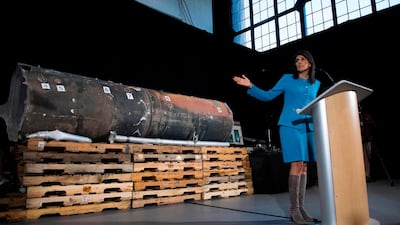The United States will seek to strengthen its case for UN action against Iran on Monday when Security Council envoys visit Washington to view pieces of weapons that it says Tehran supplied to Yemen's Houthi rebels.
The UN ambassadors will visit a military hangar near Washington where Nikki Haley, the US envoy to the United Nations, last month presented remnants of what the Pentagon said was an Iranian-made ballistic missile fired from Yemen on November 4 at Saudi Arabia's capital Riyadh, as well as other weapons.
Ms Haley and her 14 council colleagues will also have lunch with president Donald Trump, the US Mission to the United Nations said.
The Trump administration has for months been lobbying for Iran to be held accountable at the United Nations, while at the same time threatening to quit a 2015 deal among world powers to curb Iran's nuclear programme if "disastrous flaws" are not fixed.
Iran denies supplying the Houthis with weapons and described the evidence presented by the US as "fabricated".
However, experts reported to the Security Council this month that Iran had violated UN sanctions on Yemen because "it failed to take the necessary measures to prevent the direct or indirect supply, sale or transfer" of short-range ballistic missiles and other equipment to the Iran-backed Houthi group.
The independent experts said they had "identified missile remnants, related military equipment and military unmanned aerial vehicles that were of Iranian origin and were introduced into Yemen after the imposition of the targeted arms embargo".
_______________
Read more:
Trump calls on the world to curb Iran's nuclear ambitions
UAE ambassador: Iran-Houthi missiles pose significant threat to Saudi and Emirates
Davos 2018: UAE's Gargash calls for a discussion on extremist financing, blasts Iran
_______________
Ms Haley said last month that she was exploring several options to pressure through the UN to "adjust their behaviour". But she is likely to struggle to convince some Security Council members, such as veto powers Russia and China, that UN action is needed.
Most sanctions on Iran were lifted at the start of 2016 under the nuclear deal, which is enshrined in a UN Security Council resolution. The resolution still subjects Tehran to a UN arms embargo and other restrictions that are technically not part of the nuclear deal.
Ms Haley has said the Security Council could strengthen the provisions in that resolution or adopt a new resolution banning Iran from all activities related to ballistic missiles. To pass, a resolution needs nine votes in favour, and no vetoes by the United States, Britain, France, China or Russia.
Under the current resolution, Iran is "called upon" to refrain from work on ballistic missiles designed to deliver nuclear weapons for up to eight years. Some states argue that the language of the resolution does not make it obligatory.
A separate UN resolution on Yemen bans the supply of weapons to Houthi leaders and "those acting on their behalf or at their direction".
The United States could propose people or entities to be blacklisted by the council's Yemen sanctions committee, a closed-door move that would need consensus approval by the 15-members.
Diplomats say Ms Haley has not signalled which accountability option she might pursue or when.

